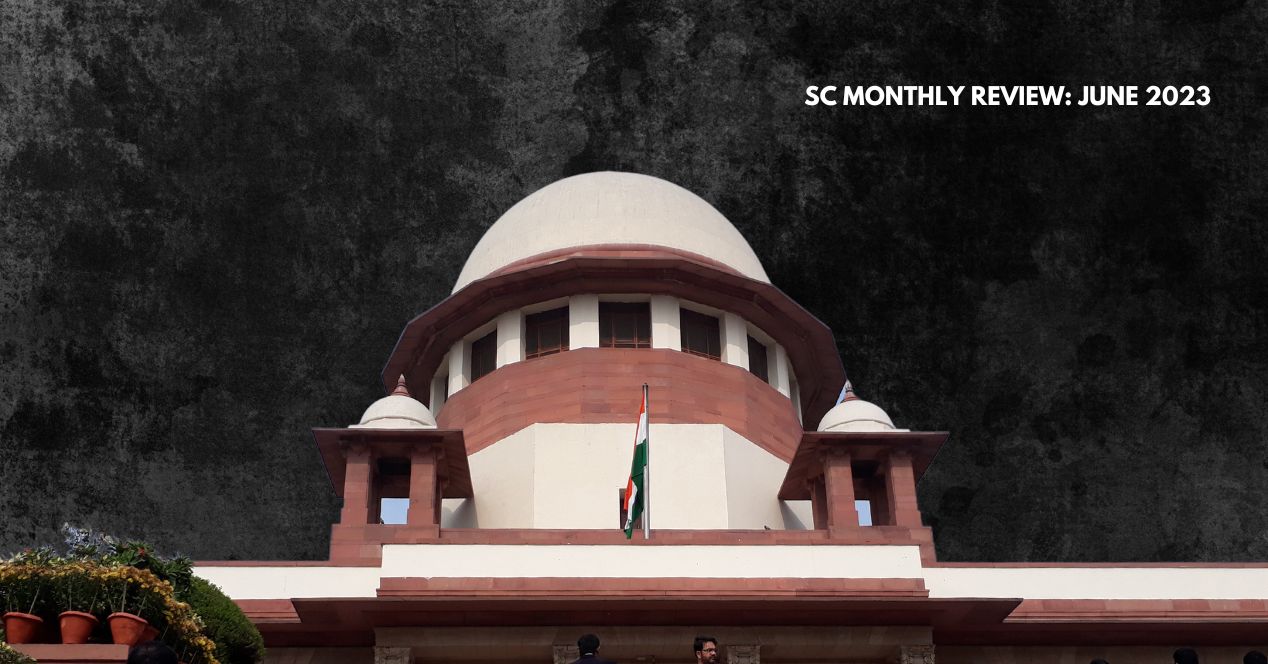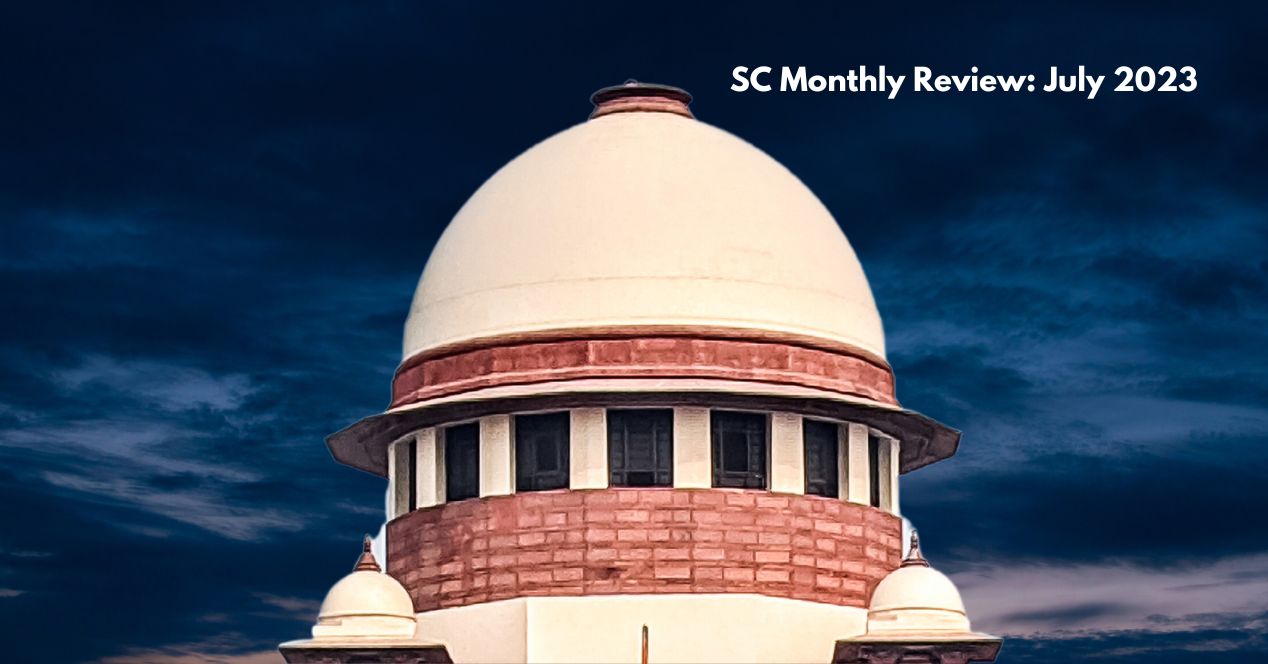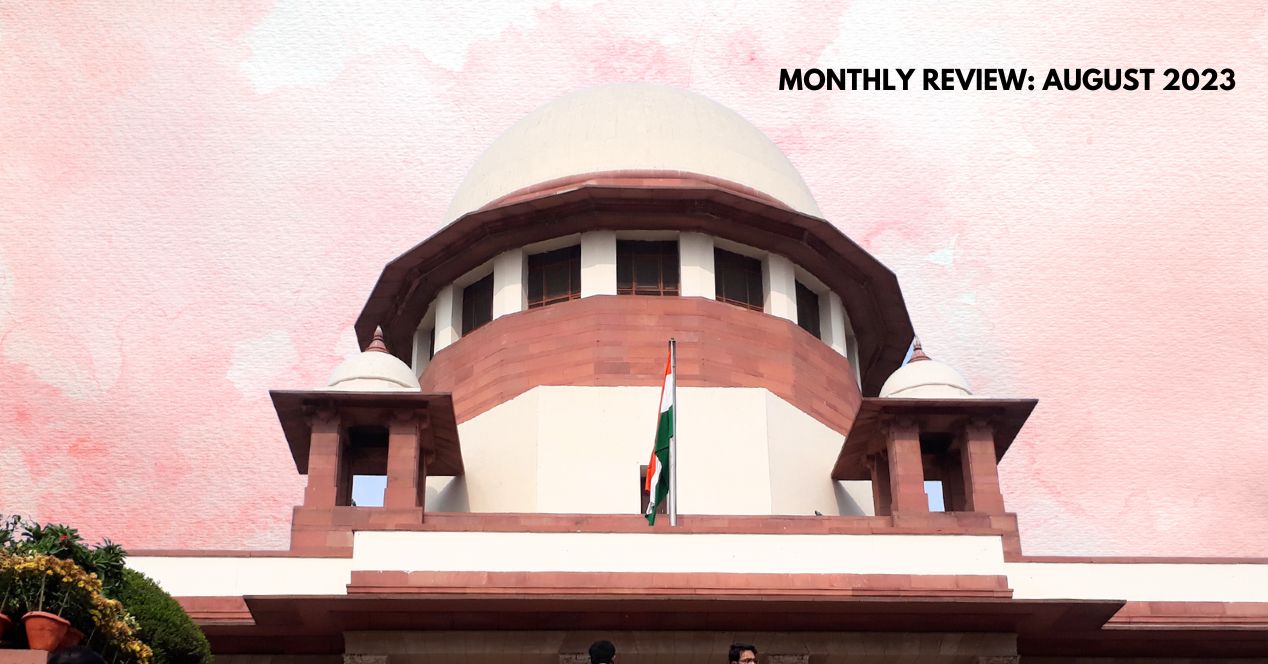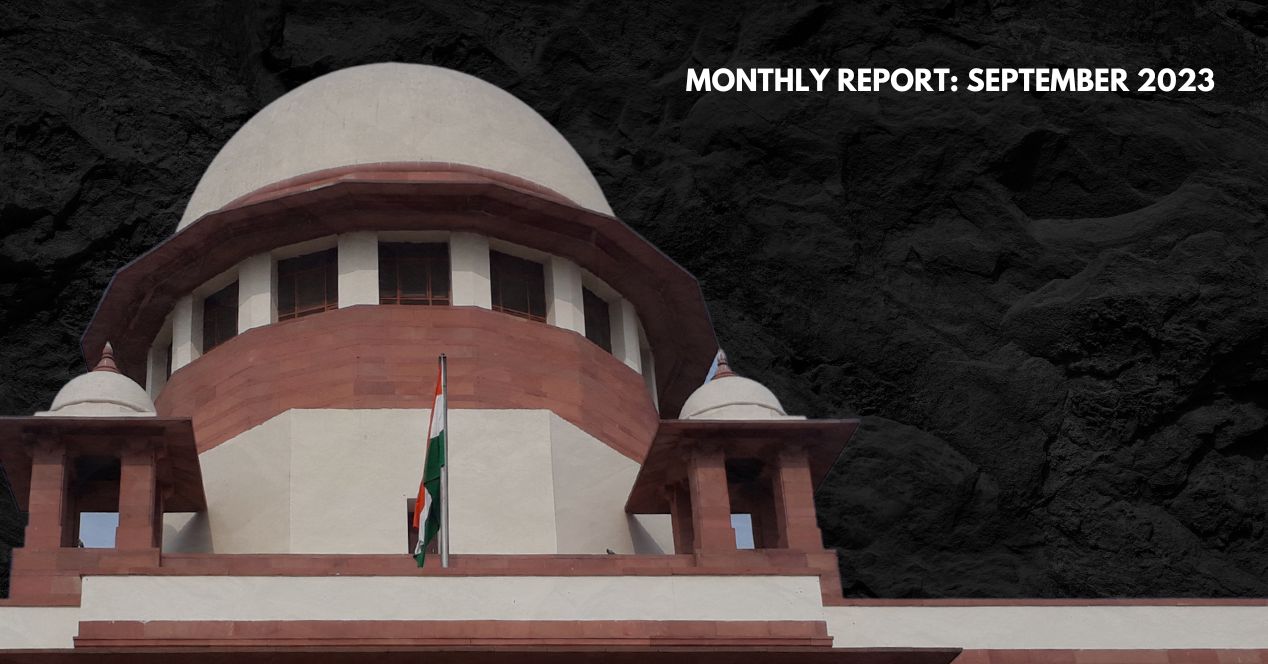Analysis
Monthly Review: October 2023
October saw the marriage equality judgement, revival of seven-judge benches, Justice Bhat’s retirement and more
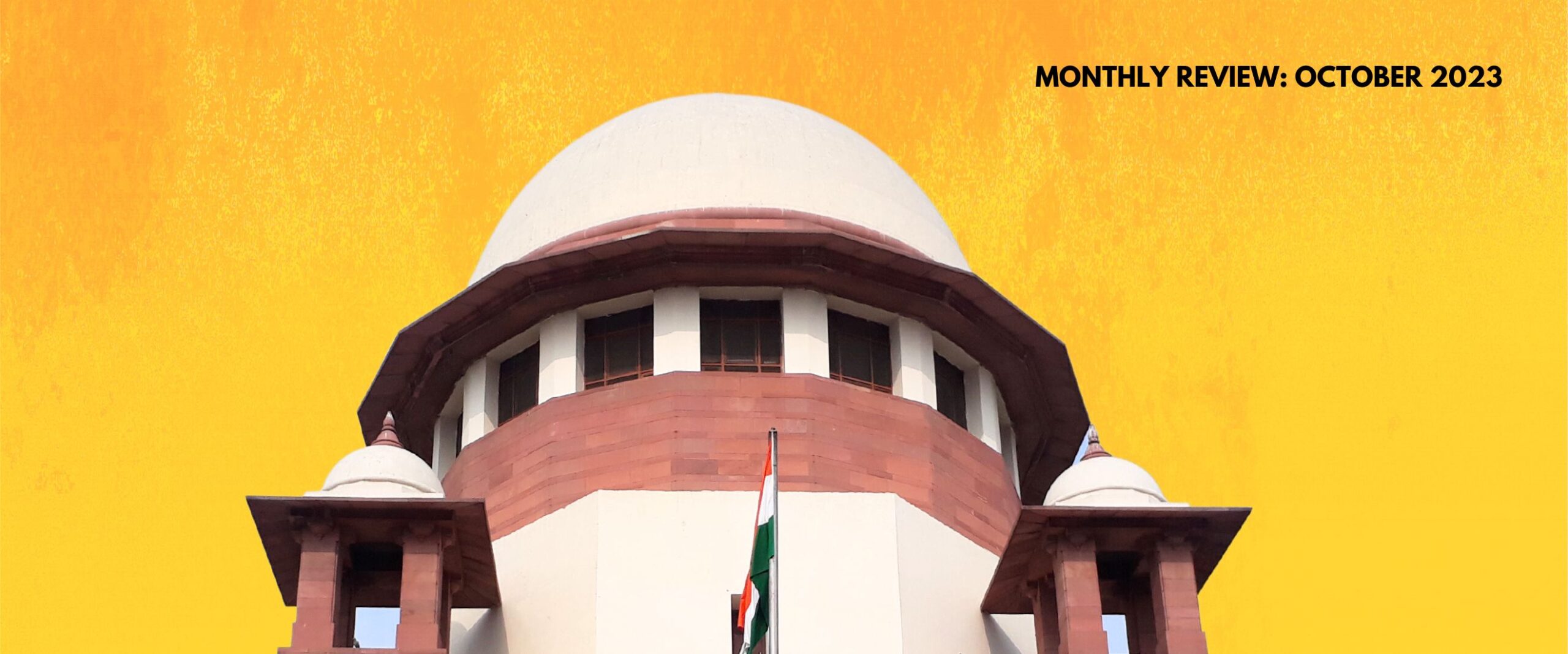
In October 2023, the Supreme Court delivered the much-awaited judgement in the plea for marriage equality five months after hearings concluded in the case. The top Court also reserved judgement in crucial cases such as the challenge to the remission granted to the Bilkis Bano gang rape convicts, immunity for MLAs in cases of bribery and the validity of an unstamped arbitration agreement.
Days after delivering the majority judgement in the marriage equality case, Justice S. Ravindra Bhat retired on 20 October 2023 after a four-year tenure at the top court. With his retirement, the Court’s sitting strength is 31 judges.
Constitution Bench Rejects the Plea for Marriage Equality
On 17 October, a five-judge bench led by Chief Justice of India D.Y. Chandrachud rejected marriage rights for sexual minorities in India under the Special Marriage Act, 1954 (SMA). The Bench also upheld the validity of the SMA stating that it would be tedious to include non-heterosexual marriages within its ambit.
Four diverse opinions were written in the case by CJI.Chandrachud, and Justices S.K. Kaul, S.R. Bhat (on behalf of Justice Hima Kohli) and P.S. Narasimha. While the bench unanimously agreed that there was no fundamental right to marry and that the SMA is constitutional, the Court was split on the right to civil union, and adoption. The majority opinion led by Justice Bhat held that sexual minorities did not have the right to civil unions. Many have criticised the judgement by saying that the top Court undertook a selective reading of its own jurisprudence to uphold the validity of the SMA. Nonetheless, the judgement will go down as a landmark decision in the history of India.
This judgement is also significant because unusually, the CJI was in the minority. Since 1950, a CJI has dissented all of 13 times.
Bilkis Bano: Does the nature of the crime matter?
On 12th October, a two-judge bench of the Court comprising Justices B.V. Nagrathna and Ujjal Bhuyan reserved judgement in the Challenge to the Early Release of Bilkis Bano Gangrape Convicts. The case was heard for a total of 14 days.
On Day 13, Advocate Shobha Gupta, appearing for Bilkis Bano, asserted that the convicts “don’t deserve any mercy” and requested the Court to send them back to prison. Gupta also argued that the case did not consider the nature of the crime despite precedents set in cases like Laxman Naskar v State of West Bengal (2000). The hearings in the case have raised questions about the nature of remission and the conflicting approaches adopted by the executive and the legislature on the subject. In SCO’s feature, we explore this tug-of-war between the two organs of the government.
Supreme Court rejects the plea for abortion of a 26-week pregnant woman
On 16 October, a three-judge bench of the Supreme Court comprising the Chief, Justices J.B. Pardiwala and Manoj Misra, rejected a 27-year woman’s plea to abort her 26-week-old pregnancy.
The petitioner had cited economic and emotional hardships and postpartum depression to seek the termination. However, the ask was an anomaly for several reasons. First, according to the Medical Termination of Pregnancy Act (amended 2021), abortion can be sought up to 24 weeks of the pregnancy. In the present case, the petitioner was already in her 26th week. Second, the petitioner insisted that the foetal heartbeat must not be stopped, which is a crucial step in the termination of pregnancies. Instead, she sought for the foetus to be medically removed and placed in an incubator till the gestation period was complete. In response to a court-ordered examination, All India Institute of Medical Sciences (AIIMS) stated that removing the baby preterm at “such low birth weight” could lead to “long-term physical and mental disability” forcing the Court to choose between foetal rights and a woman’s autonomy.
On 16 October, the bench rejected the plea for termination. They reasoned that there was no threat to the life of the mother. Further, there were no foetal abnormalities according to a report submitted by the AIIMS. The case–on both fact and procedure—marked an important turn in the pro-choice, pro-life debate. On days 1, 2 and 3 of the case, we reported on all the key takeaways.
Seven-judge Constitution Benches back in action after five years!
Validity of an unstamped arbitration agreement
On 12 October 2023, a seven-judge bench led by CJI Chandrachud reserved judgement in a case concerning the validity of an unstamped arbitration agreement after two days of hearings. The Bench was reconsidering a five-judge bench decision in NN Global Mercantile v Indo Unique Flame (2023) which held that an unstamped arbitration agreement was void and unenforceable.
The petitioners’ counsel and the amicus curiae in the case, argued that a deficient stamping was a “curable defect” in procedure and cannot render the arbitration agreement void. However, on day 2 of the hearing, Senior Advocate Shyam Divan, appearing for the respondents, asserted that the Court did not have the requisite jurisdiction to hear the case. The respondents also contended that an unstamped agreement was unenforceable and therefore void.
Immunity for legislators from criminal prosecution in bribery cases
On 5 October 2023, a seven-judge bench reserved judgement in Sita Soren v Union of India. This time the bench was reconsidering a 25-year-old, five-judge bench decision in P.V. Narasimha Rao v State (1998).
The key question in the case is whether a legislator is protected with immunity from criminal prosecution under Article 194(2) in cases of bribery. In Narasimha Rao, the Court answered in the affirmative. In the present case (Sita Soren), Senior Advocates D.S. Patwalia and Gopal Sankaranarayanan argued that the Narasimha Rao judgement presented an “absurdity” as it enabled lawmakers to become super-citizens.
Challenges to the Prevention of Money Laundering Act resurface
On 18 October 2023, a special bench consisting of Justices S.K. Kaul, Sanjiv Khanna and Bela Trivedi sat to review the Supreme Court’s 2022 decision in Vijay Madanlal Choudhary v Union of India. The bench directed the petitioners to narrow down their issues in the case.
In Vijay Madanlal, the other three-judge bench of the Court led by Justice A.M. Khanwilkar, upheld provisions of the Prevention of the Money Laundering Act (PMLA) which granted wide investigative powers to the Enforcement Directorate.
The special bench will hear the case again on 22 November 2023.
Arrests, bail and undertrial prisoners
On 3 October, journalists working for Newsclick were arrested by the Delhi Police under the Unlawful Activities (Prevention) Act, 1967 (UAPA). Soon after, 18 press bodies wrote an open letter to CJI Chandrachud condemning what they considered a wilful attack on press freedom. Since 1950, restraints on the free press could be categorised into two broad categories: direct censorship and indirect censorship via regulations. Recent years have seen the emergence of a more disturbing trend—attacks on the personal liberty of journalists, and its consequent chilling effect.
For instance, journalists Atiq-ur-Rehman and Siddique Kappan were arrested under the UAPA back in 2020. Kappan was granted bail in September 2022, and released from prison in February 2023, whereas Rehman was granted bail in March 2023, and was released in June 2023.
These stories shed light on two issues that plague the criminal justice system—imprisonment of undertrial and detention despite being granted bail. The Court is currently monitoring the issue of the grant of bail for undertrial prisoners in a suo motu petition. Experts that SCO spoke to view that the Court must take into account both structural and practical issues that cause delays at every stage of the bail process to combat the issue.
Justice S.R. Bhat Retires
On 20 October 2023, Justice S. Ravindra Bhat retired after a four-year tenure at the Supreme Court. His retirement brings the strength of the Supreme Court down to 31 judges out of the sanctioned strength of 34. Throughout his tenure, Justice Bhat authored 142 judgements with an average of 35.5 judgements a year.
A Constitutional Court: Revival of Seven and Nine-judge benches
October saw significant Constitution Bench activity. Strikingly, the Court listed several pending seven and nine-judge bench cases (some have been pending for well over 25 years) for directions.
In September 2023, the CJI announced his intention to make Constitution Benches a “permanent feature” of the Supreme Court. Given the flurry of seven and nine-judge bench cases listed this past month, the Chief’s vision seems to be taking shape. Perhaps introducing additional structural reforms will benefit the constitutional scheme of the top court better. Especially given that the Court will hear back-to-back cases in the upcoming months. These include the ongoing electoral bonds challenge, followed by the challenge to Assam’s NRC from 7 November 2023.
SCO’s Event: Book Talk with Dr Aparna Chandra
On 13 October, the Supreme Court Observer organised a book talk with Dr Aparna Chandra who co-authored the book “Court on Trial: A Data Driven Account of the Supreme Court of India”. In our conversation, she discussed critical topics such as the “disproportionate” power of the Chief Justice, access to justice, procedural solutions to relieve the overburdened court, polyvocality of the Court, and an acute view of the role of Senior advocates in the Indian justice system among other topics, which left audiences with a lot to mull over.

